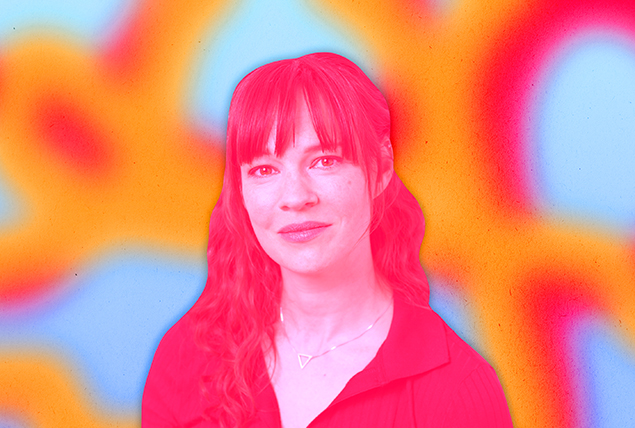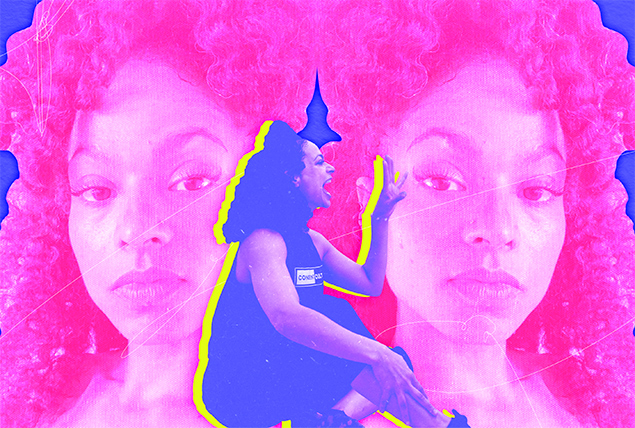Let's Get Intimate: Casey Hudecki Helps Make Sex on Screen Safe

Name: Casey Hudecki
Current Projects: "Glamorous" (Netflix), "The Horror of Dolores Roach" (Amazon Prime Video), "Gen V" (Amazon Prime Video)
Past Projects, TV: "Sex/Life" (Netflix), "The Boys" (Amazon Prime Video), "Ginny and Georgia" (Netflix), "The Handmaid's Tale" (Hulu)
Past Projects, Movies: "Pompeii" (2014), "Code 8" (2019) and "Infinity Pool" (2023)
Casey Hudecki has been intimacy coordinating—directing scenes involving sex, nudity or hyper-exposure—since before intimacy coordination was even a thing.
In the years before the #MeToo movement, Hudecki—an actress, stunt performer and coordinator—got firsthand experience performing scenes involving sex. She also worked as a fight director in the theater choreographing scenes that involved violence.
"And that often included sexual violence," she added.
Word of her unique skillset spread around Hollywood, and directors began calling on Hudecki to coordinate particularly difficult or delicate scenes involving sexual acts.
In 2017, the #MeToo movement delivered Hollywood a wake-up call to better protect actors—everyone for that matter—from abuse and exploitation. In the aftermath of the movement, studios began scrambling to show their dedication to actors' sexual and emotional safety. Thus, the role of intimacy coordinator was born.
Hudecki emerged as an early authority.
"My skillset in terms of stunts is creating an illusion for the camera," she noted. "When someone gets punched, they're ideally not actually getting punched. It's the same with simulated sex. They're not actually having sex. We have to create a dance with the cast and the camera to create a convincing illusion."
Hudecki trained as an intimacy coordinator with Alicia Rodis, the in-house intimacy coordinator for HBO who pioneered the role in the United States. During her training, Hudecki said she added elements of advocacy and consent and mental health, as well as first aid, trauma awareness and sexuality bias training, to her repertoire.
Fast forward to the present day, and intimacy coordinating is one of the industry's fastest-growing professions.
Hudecki, who lives in Toronto, has remained plenty busy, working as an intimacy coordinator on shows such as "Sex/Life" and "The Handmaid's Tale", as well as movies such as "Infinity Pool" with Alexander Skarsgård and "Stardust" with Johnny Flynn.
Along with fellow intimacy coordinator Lindsay Somers, she founded and teaches at Intimacy Coordinators Canada, an organization that trains and accredits future intimacy coordinators.
"Our hope is to raise the standards of this work, not just in Canada, but everywhere," she said.
In an exclusive interview with Giddy, Hudecki describes her highly unique profession, talks about her favorite Hollywood sex scenes and shares hopes for a future with more diverse depictions of sex.
Editor's Note: This interview has been edited for length and clarity.
What does an intimacy coordinator do?
Our job is about weaving consent into a very fast-paced industry. When I did my sex scenes a million years ago, I didn't have any information about what I would be wearing, what I would be doing, who would be watching—that sort of thing. So even though I was treated respectfully and there was no harm done, necessarily, I still felt this sort of confusion and shame.
Intimacy coordinators are there to ensure all those questions get answered and that there are no surprises on the day of. We don't create content necessarily—that comes from the director, the showrunners and the writers. We have a discussion with them about what the vision is. Our job is to help them facilitate that vision within the boundaries of the performers.
I like to think of intimacy coordinators as a tool. We have coaching and choreography skills, and if that can assist the production, then absolutely, we put those to use. How much we get to choreograph is kind of up to the production and director. Some directors would like help in that respect, while others can handle it very well themselves.
For example, on "Sex/Life," I choreographed pretty much everything. Stacy Rukeyser, the show creator, was very clear about what she wanted to see. I got very hands-on with the performance of the breath, what positions might work well, how the camera might move, etc. So I had a lot of input on that show, which was really nice.
What do you like most about your job?
I like the creative element. I have worn a lot of hats in this industry and in all of them, I have been a storyteller. For me, the sooner you start the conversation around the scene of nudity or simulated sex, the more authentic it can be to that actor, to that story.
What's the hardest part of your job?
The trickiest part of the job is navigating the resistance to the role because it's new.
Anyone who does this job is very likely the first one to do it with many of the crew members or production members. So I find a lot of my job is educating people about what my job is and convincing them that I'm not there to censor anything.
Do you have a favorite project you've worked on?
I have a lot of them. Right before the pandemic, I did a scene for "American Gods" that they kept calling a pansexual love-in where we had 50 performers, and they weren't all human. It was a whimsical, weird, out-of-time, out-of-place scene where we had every kind of sexuality and gender. It was open and free and beautiful.
I like scenes where we push the boundaries of the normal and it's slightly removed from your everyday.
What's your favorite sex scene of all time?
The ones that stand out for me are the ones where the connection is very prevalent.
For example, in "Indiana Jones and the Raiders of the Ark," you want Indiana Jones and Marion to get together the whole time. Then they finally do and he's hurt everywhere and they try to figure out where they can kiss that won't hurt. In the end, he falls asleep and it's so adorable.
Has being an intimacy coordinator taught you anything about sex?
The main thing it's taught me is that representation really matters and that we are shaped by what we see. There are a lot of shortcuts that we take in television sex—especially where clothes come off magically and the orgasms are very performative and instantaneous with no foreplay.
I think we need a little bit more representation of a variety of bodies, of sexualities, and just the messiness and silliness of sex.
I think we gloss it over, and there's a time and a place for that in television and film, of course. Sometimes we just want to see the fairy tale. But I think it's important we start widening the variety of the kinds of sex we portray because that changes the way that we think about sex and the way we have sex, too.


















